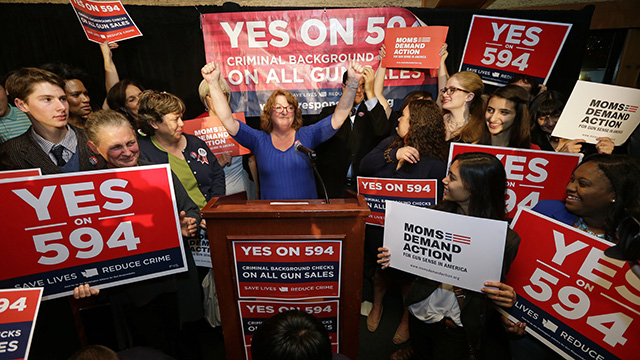This post first appeared at The Nation.
There weren’t many bright spots for progressives on Tuesday, but if you back stronger gun laws, things went even better than you could have reasonably expected.
The big news was in Washington state, where a ballot initiative implementing tough universal background checks on gun purchases and transfers passed with nearly 60 percent of the vote. The vote was already projected to pass and came on the heels of a mass shooting at a Seattle-area high school that left four students dead.
A dueling initiative that would ban such checks failed badly. Pro-gun advocates had at least hoped the two initiatives would confuse voters and perhaps both would pass and create a legally chaotic situation, but they appear to have underestimated Washingtonians’ engagement on the issue.
Now, Washington state will have a model system where virtually every gun purchase — even online and at gun shows — will be subject to a background check. There are very narrow exceptions for antique gun sales and transfers within families, but even lending someone a gun for 24 hours would require a check.
The victory is important well beyond Washington state, too — it’s a model for other states to undertake similar reform while DC dithers. Nevada is already going to vote on a very similar measure in 2016, which will no doubt propel the issue into the presidential race since Nevada hosts key primaries for both parties and is also a valuable swing state.
Washington also demonstrated that the National Rifle Association can be beaten — it spent almost half a million dollars against the ballot initiative, but it didn’t matter. Gun-reform groups showed they can come in with big money of their own and win crucial votes.
“[Washington voters] showed that while the gun lobby can intimidate politicians in Washington, it’s a lot harder to intimidate America’s voters,” former US Rep. Gabby Giffords said in a statement last night. “This victory for responsibility in Washington State sends a clear message to the other Washington that if Congress is not ready to act to reduce gun violence, voters in states around the country can and will take the matter into their own hands.”
But that wasn’t all. In race after race across the country, gun reform pretty much ran the table:
- Three governors signed tough new gun restrictions into law after the shootings at Sandy Hook Elementary School: New York Gov. Andrew Cuomo, Connecticut Gov. Dan Malloy and Colorado Gov. Mark Hickenlooper. All had opponents that loudly criticized the gun reforms, but all three incumbents won on Tuesday.
- Cuomo’s victory wasn’t in doubt, but Malloy and Hickenlooper faced very tough races. The NRA went particularly hard after Hickenlooper, but he pulled out an unlikely victory — with a lot of help from gun-reform groups like Bloomberg’s Everytown and Giffords’ Americans for Responsible Solutions.
- Rep. Elizabeth Esty, a Democratic incumbent in Connecticut who represents Newtown, beat back a challenge from a Republican who opposed new gun laws. That would have been a devastating symbolic loss for the gun-reform movement. We profiled that race back in September, here.
- Republican Susan Collins of Maine won re-election handily. She was one of only four Republicans to vote for the Manchin-Toomey background-check bill, and it didn’t appear to cost her anything politically. “Sen. Collins’ re-election tonight in Maine, a state with a proud history of gun ownership, proves that elected officials can support common-sense measures to reduce gun violence without infringing on the constitutional rights of their constituents,” said Everytown in a statement.
- On the flip side, Democratic Sen. Mark Pryor lost his bid for re-election in Arkansas despite opposing the background-check bill. The NRA dropped over a million dollars to beat him anyway, and gun-reform groups didn’t give a dime in support.
- Cook County, Illinois, passed an advisory referendum on Tuesday backing much tougher gun laws, including universal background checks and bans on assault weapons and high-capacity magazines. It passed with a whopping 86.5 percent of the vote.
One final victory may come in the Arizona district that used to be held by Giffords. Her former chief of staff, Representative Ron Barber, faced a tough race against Republican Martha McSally that was riven with controversy over gun control. This seat also carries heighten symbolism for the gun-reform movement.
The race is currently too close to call, with Barber behind by as little as 75 votes. Barber declared last night he was confident in victory. We’ll update this post when the result is known.



